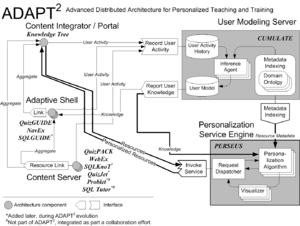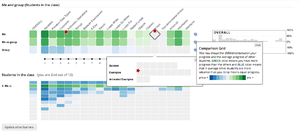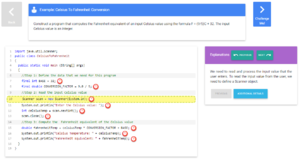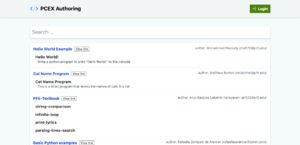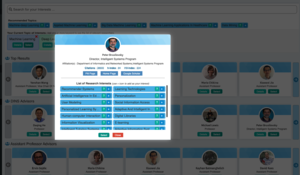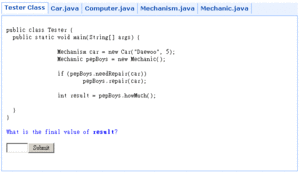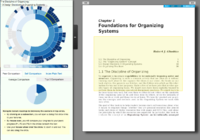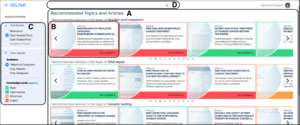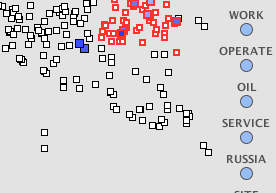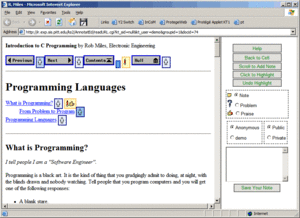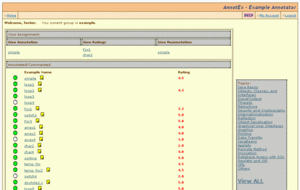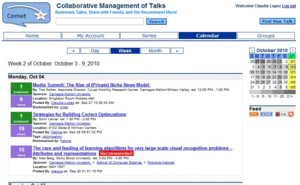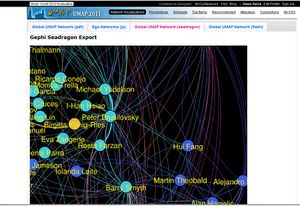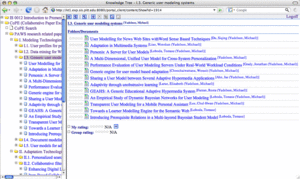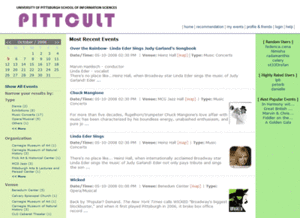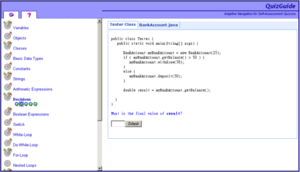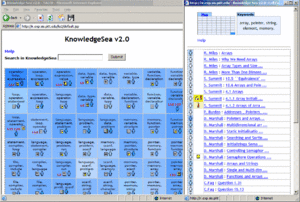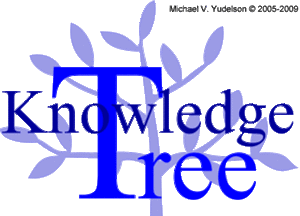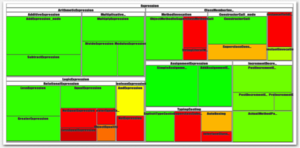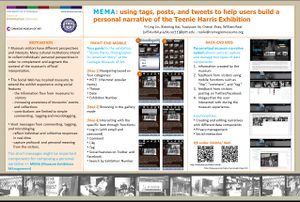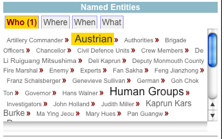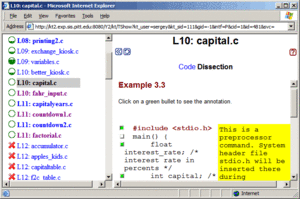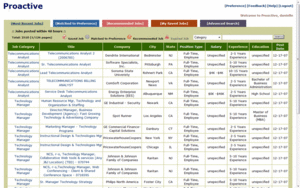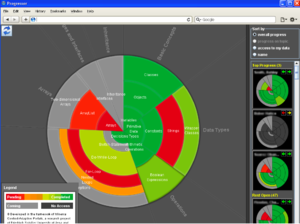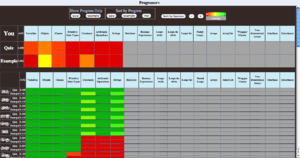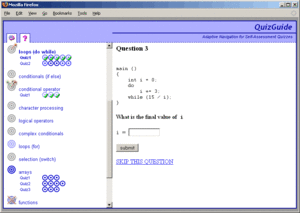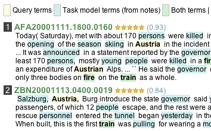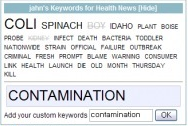Difference between revisions of "Systems"
(→TaskSieve) |
(→Smart Learning Content for Computing Education) |
||
| (130 intermediate revisions by 12 users not shown) | |||
| Line 1: | Line 1: | ||
| − | == AdVisE == | + | Our group explores several kinds of information systems focused mostly on personalized systems (such as adaptive learning and recommender systems) and various kinds of systems that support human navigation in information space (such as adaptive hypermedia and social navigation). This page presents a brief overview of the types of systems we explore and follows with a quick overview of the systems and frameworks developed at [[Main Page|PAWS]] lab. |
| − | ==== | + | This page presents the main types of topics and technologies explored by PAWS Lab. Like other Wiki pages, it is permanently in construction. |
| + | |||
| + | = System Types = | ||
| + | |||
| + | == Personalized Learning Systems == | ||
| + | |||
| + | Personalized learning technologies provide an alternative to the dominant “one-size-fits-all” approach to treating diverse student audiences. While having a relatively long history, this research direction moved to the forefront only recently when modern information technologies opened new learning opportunities for a wide range of students. Nowadays, personalized learning is considered to be a top priority research direction by many experts. For example, [http://www.engineeringchallenges.org/cms/8996/9127.aspx advanced personalized learning] was named among [http://www.engineeringchallenges.org/ 14 Grand Challenges for Engineering] along with preventing nuclear terror and making solar energy economical. It has also been listed among the highest funding priorities in [http://cacm.acm.org/magazines/2010/2/69358-assessing-the-changing-us-it-rd-ecosystem/fulltext Communications of the ACM]. | ||
| + | |||
| + | Personalized learning technologies enable e-learning systems to maintain a model of the goals, preferences and knowledge of each student and apply this model to adapt the system performance to the student making the learning process more efficient and enjoyable. In so doing, various kinds of personalized e-learning systems demonstrated their ability to help students acquire knowledge faster, improve learning outcomes, reduce navigational overhead, and increase student engagement. Our team is interested a range of personalized learning technologies, focusing on modeling learner knowledge of the subject. Individual models of learner knowledge that our systems maintain are used to guide learners to the most appropriate learning content using course sequencing and adaptive navigation support technologies. Some systems also use the models to deliver adaptive visualization. Below is the list of personalized learning systems developed by our group. Most of these systems are open for anyone to use and explore online. | ||
| + | |||
| + | More at [[Personalized Learning Systems]] | ||
| + | |||
| + | Systems: | ||
| + | * [[QuizGuide]] | ||
| + | * [[NavEx]] | ||
| + | * [[Database Exploratorium]] | ||
| + | * [[KnowledgeZoom]] | ||
| + | * [[MasteryGrids]] | ||
| + | * [[JavaGuide]] | ||
| + | * [[Progressor]] | ||
| + | * [[ProgressorPlus]] | ||
| + | |||
| + | == Smart Learning Content for Computing Education == | ||
| + | |||
| + | To support our research on personalized learning, we developed several types of [[Smart Content]] for Computing Education. Smart content engages students in various kinds of interaction - exploration, simulation, problem solving - and use a rich trace of learning data generated by students interacting with this content to better model learner's knowledge. For some types of smart content activities we have authoring and delivery systems, other types are just collection of items, which you could use but can't edit. An overview of our smart content types can found on the [[Smart Content]] page. Systems supporting delivery and authoring of smart content are listed below. | ||
| + | |||
| + | * [[Smart Content]] types supported by [[ADAPT2]] infrastructure and [[MasteryGrids]] interface | ||
| + | * [[PCEX]] - advanced code worked examples that could be created with [[WEAT]] | ||
| + | * [[QuizJET]] - code tracing problems for Java that could be created with [[QuizJET Authoring System]] | ||
| + | * [[QuizPET]] - code tracing problems for Python that could be created with [[QuizPET Authoring System]] | ||
| + | * [[WebEx]] - simple code worked examples that could be created with [[AnnotEx]] | ||
| + | |||
| + | == Adaptive Information Retrieval Systems == | ||
| + | Systems: | ||
| + | |||
| + | * [[TaskSieve]] | ||
| + | * [[YourNews]] | ||
| + | |||
| + | == Recommender Systems == | ||
| + | |||
| + | * [[Grapevine]] | ||
| + | * [[HELPeR]] | ||
| + | * [[Proactive]] | ||
| + | * [[CourseAgent]] | ||
| + | * [[Cross-Domain Recommender Systems]] | ||
| + | * [[Social Recommender Systems]] | ||
| + | |||
| + | == Social Information Access Systems == | ||
| + | Systems: | ||
| + | * [[ImageSieve]] | ||
| + | * [[NameSieve]] | ||
| + | |||
| + | == Personalized Social Systems for Local Communities == | ||
| + | Systems: | ||
| + | * [[Conference Navigator 3]] | ||
| + | * [[Eventur]] | ||
| + | * [[CoMeT]] | ||
| + | |||
| + | = Currently Active Systems = | ||
| + | |||
| + | == ADAPT<sup>2</sup> Infrastructure== | ||
| + | |||
| + | |||
| + | {| | ||
| + | | valign="top" | [[Image:adapt2-arcitecture.gif|thumb|left|'''100'''|ADAPT<sup>2</sup> Architecture]] | ||
| + | | valign="top" | ADAPT<sup>2</sup> (read adapt-square) - Advanced Distributed Architecture for Personalized Teaching and Training - is a framework targeted at providing personalization and adaptation services for developers of content that lacks personalization. [[ADAPT2|more]]) | ||
| + | |} | ||
| + | |||
| + | == CUMULATE == | ||
| + | [[CUMULATE]] is a centralized user modeling server built for the [[ADAPT2|ADAPT<sup>2</sup>]] architecture. It is mainly targeted at providing user modeling support for adaptive educational hypermedia (AEH) systems. [[CUMULATE]] maintains a set of overlay models of students' knowledge. It uses several techniques for computing student models, including thresholded averaging, asymptotic user knowledge assessment, time-spent-reading. | ||
| + | ([[CUMULATE|more]]) | ||
| + | |||
| + | == Mastery Grids == | ||
| + | |||
| + | {| | ||
| + | |valign="top" | [[Image:Mg_1.png|thumb|left|'''100'''|Mastery Grids Interface]] | ||
| + | |valign="top" | Mastery Grids is our latest implementation of Open Social Learner Modeling (OSLM). It is both an innovative Open Social Learner Model Interface and an adaptive E-learning platform with integrated functionalities enabling multi-facet social comparison, open learner modeling, and adaptive navigation support to access multiple kinds of smart learning content. Mastery Grids is supported by adaptive social learning framework [[Aggregate]]. This framework supports several kinds of open student modeling, social comparison, and recommendation. In detail, Mastery Grids presents and compares user learning progress and knowledge level using colored grids, tracks user activities with learning content, and provides flexible user-centered navigation across different content levels (e.g. topic, question) and different content types (e.g. problem, example). Our past research shows that open student modeling and social comparison effectively increases students’ performance, motivation, engagement and retention. | ||
| + | |||
| + | * [[Mastery Grids Interface|More about Mastery Grids]] | ||
| + | * [http://adapt2.sis.pitt.edu/um-vis-adl/index.html?usr=adl01&grp=ADL&sid=test&cid=13&data-top-n-grp=5&def-val-rep-lvl-id=p&def-val-res-id=AVG&ui-tbar-rep-lvl-vis=0&ui-tbar-topic-size-vis=0 An interactive demo of Mastery Grids interface] | ||
| + | |} | ||
| + | |||
| + | == Program Construction Examples ([[PCEX]])== | ||
| + | {| | ||
| + | | valign="top" | [[Image:Pcex_ex.PNG|thumb|left|'''100'''|Program Construction Examples]] | ||
| + | | valign="top" | PCEX is an interactive learning tool which demonstrates program construction examples to help students to develop program construction skills. It supports exploring the program construction examples freely and provide challenges to the students to help them self-assess their learning of program construction knowledge. It is now a component of [[ADAPT2]] Infrastructure. | ||
| + | |||
| + | * [[PCEX|More about PCEX]] | ||
| + | |||
| + | |} | ||
| + | |||
| + | ==[[WEAT]]== | ||
| + | {| | ||
| + | | valign="top" | [[Image:weat.png|thumb|left|'''100'''|Worked Example Authoring Tool]] | ||
| + | | valign="top" | Worked Example Authoring Tool (WEAT) is an authoring tool for PCEX. The integrated ChatGPT support can be used to generate code explanations required for creating a program construction example. Created examples can be shared publicly with others, embed through iframes, or in an LMS like Canvas. | ||
| + | |||
| + | * [[WEAT|More about WEAT]] | ||
| + | * [[WEAT_Tutorial|WEAT's User Manual]] | ||
| + | * [https://youtu.be/IOfA0Ql3Zq0 WEAT Video Tutorial] | ||
| + | |||
| + | |} | ||
| + | |||
| + | == [[Grapevine]] == | ||
| + | {| | ||
| + | |valign="top" | [[Image:Grapevine.png|thumb|left|'''100'''|Grapevine]] | ||
| + | |valign="top" | Grapevine is an interactive recommender system that assists students in finding advisors for their projects - from undergraduate capstone projects to PhD thesis work. It has been developed as a part of Personalized Education project sponsored by the University of Pittsburgh ([[Grapevine|more]]) | ||
| + | |} | ||
| + | |||
| + | == QuizJET == | ||
| + | {| | ||
| + | |valign="top" | [[Image:Quizjet.gif|thumb|left|'''100'''|QuizJET]] | ||
| + | |valign="top" | QuizJET is a system serves quizzes as a self-assessment Java Evaluation Tool. It's mainly used to assess students' knowledge in Java Programming Language. QuizJET randomly generates a question parameter, creates a presentation of the parameterized question in a Web-based quiz, compares student's input to the correct answer which QuizJET runs the parameterized code "behind the stage", and records the results into a server-side database. It is now a component of [[ADAPT2]] Infrastructure. ([[QuizJET|more]]) | ||
| + | |} | ||
| + | |||
| + | |||
| + | == ReadingCircle == | ||
| + | {| | ||
| + | | valign="top" | [[Image:Readingcircle1.png|left|thumb|200px|ReadingCircle interface.]] | ||
| + | | valign="top" | ReadingCircle is a system that explores approaches to encourage student reading using a social progress visualization interface. Click on the link to [[ReadingCircle]] to see more details. | ||
| + | |} | ||
| + | |||
| + | == [[HELPeR]] == | ||
| + | |||
| + | {| | ||
| + | |valign="top" | [[Image:Helper.png|thumb|left|'''100'''|[[HELPeR]]]] | ||
| + | |valign="top" | Health e-Librarian with Personalized Recommender (HELPeR) is an interactive personalized search and recommender system designed to provide access to health information for cancer patients and their caregivers ([[HELPeR|-->more]]) | ||
| + | |} | ||
| + | |||
| + | == [[WebEx]] == | ||
| + | {| | ||
| + | | valign="top" | [[Image:AnnotatedExamples.jpg|left|thumb|200px|Screenshot of the WebEx interface.]] | ||
| + | | valign="top" | [[WebEx]] is a system that serves annotated code examples known also as dissections. Each dissection is a sequence of lines that have annotations associated with them. Dissections are grouped into collections - scopes. The natural domain of WebEx is programming. However, other applications are also possible, e.g. poetry. It is now a component of [[ADAPT2]] Infrastructure. It is one of the oldest PAWS systems, but WebEx is used in to provide access to examples in several domains. It is mostly superseded by [[PCX]] system which has more features. | ||
| + | |} | ||
| + | |||
| + | ([[WebEx|more]]) | ||
| + | |||
| + | = Earlier Systems = | ||
| + | == AdVisE (Adaptive Document Visualization for Education) == | ||
| + | ==== ADVISE 2D ==== | ||
Two dimensional document visualization based on inter-document similarities. The locations of the documents on the 2D space are determined by their similarities to another documents and users can visually see the relationships of the documents based on their contents. | Two dimensional document visualization based on inter-document similarities. The locations of the documents on the 2D space are determined by their similarities to another documents and users can visually see the relationships of the documents based on their contents. | ||
| − | ==== | + | ==== ADVISE 3D ==== |
Three dimensional visualization of documents based on similarities. By adding one more dimension to 2D visualization, users are able to explore the document space more easily and access each document. | Three dimensional visualization of documents based on similarities. By adding one more dimension to 2D visualization, users are able to explore the document space more easily and access each document. | ||
| − | |||
| − | |||
| − | ([http://ir.exp.sis.pitt.edu/advise more on | + | ==== ADVISE VIBE ==== |
| + | |||
| + | Relevance-based visualization of educational documents based on re-implementation of VIBE, a document visualization method based on similarities between documents and POIs (Points Of Interests) developed by Molde College and School of Information Sciences, University of Pittsburgh. | ||
| + | |||
| + | ([http://ir.exp.sis.pitt.edu/advise more on ADVISE]) | ||
| + | |||
| + | ==Adaptive VIBE== | ||
| + | |||
| + | {| | ||
| + | | valign="top" | [[Image:AdaptiveVibe_part.png|thumb|left|'''100'''|Adaptive VIBE]] | ||
| + | | valign="top" | Two dimensional visualization based on POIs(Point Of Interest, or concepts) and document similarities. The position of the documents are calculated by their relationships with each POI. | ||
| + | |||
| + | * [http://amber.exp.sis.pitt.edu/~codex/tasksieve System Link] (Adaptive VIBE integrated into TaskSieve) | ||
| + | * [[Adaptive_VIBE | more on Adaptive VIBE]] | ||
| + | |} | ||
== AnnotatEd == | == AnnotatEd == | ||
| Line 19: | Line 169: | ||
| valign="top" | [[Image:AnnotEx.gif|thumb|left|'''100'''|AnnotEx]] | | valign="top" | [[Image:AnnotEx.gif|thumb|left|'''100'''|AnnotEx]] | ||
| valign="top" | AnnotEx - Example Annotator- is a web-based community based authoring tool for annotating programming examples.([[AnnotEx|more]]) | | valign="top" | AnnotEx - Example Annotator- is a web-based community based authoring tool for annotating programming examples.([[AnnotEx|more]]) | ||
| + | |} | ||
| + | |||
| + | == CoMeT == | ||
| + | |||
| + | {| | ||
| + | | valign="top" | [[Image:comet.gif|thumb|left|'''100'''|Comet]] | ||
| + | | valign="top" | COMET is a social system for sharing informaion about research talks. It allows to collaboratively collect, publish, and tag interesting research talks in Pittsburgh. COMET allows its users to schedule the talks they want to attend. It also automatically reminds about bookmarked talks and recommends other talks that fits isers' interests. ([http://halley.exp.sis.pitt.edu/comet/ visit COMET]) | ||
| + | |} | ||
| + | == Conference Navigator 3== | ||
| + | {| | ||
| + | | valign="top" | [[Image:Cn3.jpg|thumb|left|'''100'''|CN3]] | ||
| + | | valign="top" | Conference Navigator 3 (CN3) is a personal conference scheduling tool with social linking and recommendation features. Users can control access to their information in the CN3 system and link their account with third party academic and non-academic social networks such as linkedIn, Facebook, citeulike, or Mendeley. Our main goal is to enhance attendees' experience at the conferences, and also investigate the mechanisms that drives attendees to engage in their research community. ([http://halley.exp.sis.pitt.edu/cn3/ visit Conference Navigator 3]) | ||
|} | |} | ||
| Line 31: | Line 193: | ||
([[CourseAgent|more]]) | ([[CourseAgent|more]]) | ||
| − | == | + | == Eventur == |
| − | [[ | + | {| |
| − | ([[ | + | | valign="top" | [[Image:Pittcult.gif|thumb|left|'''100'''|PittCult]] |
| + | | valign="top" | This project is to recommend interesting information using the combined technology of collaborative filtering and trust-based human network. This system is to overcome the emerging problems regarding collaborative filtering recommendations and to investigate how the information propagation is affected by trust among people. ([[Eventur|more]]) | ||
| + | |} | ||
| + | |||
| + | |||
| + | == JavaGuide == | ||
| − | == | + | {| |
| − | + | | valign="top" | [[Image:JavaGuide.png|thumb|left|'''100'''|JavaGuide]] | |
| − | ([[ | + | | valign="top" | JavaGuide is a personalized front-end for QuizJET developed by PAWS Lab (Hsiao, 2010). Java Guide collects student performance data sent by QuizJET to the activity storage, determines student current level of knowledge for multiple topics and concepts of Java programming language, and use it to provide adaptive guidance to the questions that are most appropriate for a specific student given the course goals and current state of knowledge.. ([[JavaGuide|more]]) |
| + | |} | ||
== Knowledge Sea II == | == Knowledge Sea II == | ||
| Line 50: | Line 218: | ||
| valign="top" | Knowledge Tree is a link aggregating portal. It presents content structured according to the folder-document paradigm. Knowledge Tree provides authentication and authorization and implements a simplified form of access control. It supports collaborative authoring and social annotation. ([[Knowledge Tree|more]]) | | valign="top" | Knowledge Tree is a link aggregating portal. It presents content structured according to the folder-document paradigm. Knowledge Tree provides authentication and authorization and implements a simplified form of access control. It supports collaborative authoring and social annotation. ([[Knowledge Tree|more]]) | ||
|} | |} | ||
| + | == KnowledgeZoom == | ||
| + | {| | ||
| + | | valign="top" | [[Image:KnowledgeZoom.png|thumb|left|'''100'''|KnowledgeZoom]] | ||
| + | | valign="top" | [[KnowledgeZoom]] is an exam preparation system with zoomable open student model showing student level of knowledge for hierarchy of Java programming concepts. KnowledgeZoom allows students to find gaps in their knowledge and access learning content that helps to bridge these gaps. | ||
| + | |||
| + | * [[KnowledgeZoom|More about KnowledgeZoom]] | ||
| + | |} | ||
| + | |||
| + | |||
| + | == MEMA == | ||
| + | {| | ||
| + | |valign="top" | [[Image:MEMA.jpg|thumb|left|'''100'''|MEMA]] | ||
| + | |valign="top" | MEMA (Museum Exhibition MAnagement) ([[MEMA|more]]) | ||
| + | * [http://halley.exp.sis.pitt.edu/mema/web/ Web System link] | ||
| + | * [http://halley.exp.sis.pitt.edu/mema Mobile System link] | ||
| + | |} | ||
| + | |||
== NameSieve == | == NameSieve == | ||
| − | + | ||
| − | ([[NameSieve|more]]) | + | {| |
| + | |valign="top" | [[Image:NameSieve-NEpanel.png|thumb|left|'''100'''|NameSieve Named-entity Navigator]] | ||
| + | |valign="top" | A name-entity based news exploration and filtering system. Important named-entities extracted from the search results are provided in the "cloud" form and helps further exploration. ([[NameSieve|more]]) | ||
| + | |||
| + | * [http://amber.exp.sis.pitt.edu/namesieve System Link 1] | ||
| + | * [http://ir.exp.sis.pitt.edu/~jahn/cma/index.php System Link 2] (Carnegie Museum of Art version) | ||
| + | |} | ||
| + | |||
== NavEx - Navigation to Examples == | == NavEx - Navigation to Examples == | ||
| Line 67: | Line 259: | ||
|} | |} | ||
| − | == | + | == Proactive == |
| + | {| | ||
| + | | valign="top" | [[Image:Proactive.gif|thumb|left|'''100'''|Proactive]] | ||
| + | | valign="top" | The Proactive is content-based job search and recommender system which is based on several knowledge engineering technology and personalized techniques. The system is adapts to each user by collecting various user's usage patterns. It integrates several approaches to provide access to job information ([[Proactive|more]]) | ||
| + | |} | ||
| + | |||
| + | == Progressor == | ||
{| | {| | ||
| − | | valign="top" | [[Image: | + | | valign="top" | [[Image:Progressor.png|thumb|left|'''100'''|Progressor]] |
| − | | valign="top" | | + | | valign="top" | The Progressor is a system of personalized visual access to programming problems, which is based on open social user modeling technology and personalized techniques. ([[Progressor|more]]) |
|} | |} | ||
| − | == | + | == Progressor+ == |
{| | {| | ||
| − | | valign="top" | [[Image: | + | | valign="top" | [[Image:progressorplus1.png|thumb|left|'''100'''|ProgressorPlus]] |
| − | | valign="top" | | + | | valign="top" | Progressor+ extends the benefits from Progressor and addresses the problems in personalized and social learning of how to help students to find the most appropriate educational resources and engage them into using these resources. Progressor+ adopts the same idea of open student modeling visualization and uses generic table representation for accessing and visualizing assorted educational content ([[ProgressorPlus|more]]) |
|} | |} | ||
| + | |||
== QuizGuide == | == QuizGuide == | ||
| Line 85: | Line 284: | ||
|} | |} | ||
| − | == | + | == SetFusion == |
| − | + | coming soon | |
| − | + | ([[SetFusion|more]]) | |
| − | + | ||
| − | + | == TalkExplorer == | |
| + | coming soon | ||
| + | ([[TalkExplorer|more]]) | ||
== TaskSieve == | == TaskSieve == | ||
{| | {| | ||
| − | |valign="top" | [[Image:TaskSieve.png|thumb|left|'''100'''|TaskSieve]] | + | |valign="top" | [[Image:TaskSieve-surrogates.png|thumb|left|'''100'''|TaskSieve -- mediates query and user model]] |
| − | |valign="top" | An experimental personalized news search system based on task models and the interface | + | |valign="top" | An experimental personalized news search system based on task models and the interface to mediate between the query and the task model. Users can select three options (1) query only, (2) task model only, and (3) both. ([[TaskSieve|more]]) |
| + | * [http://amber.exp.sis.pitt.edu/tasksieve System link 1] | ||
| + | * [http://amber.exp.sis.pitt.edu/~codex/tasksieve System link 2] (newer version integrated with Adaptive VIBE) | ||
|} | |} | ||
| Line 105: | Line 308: | ||
{| | {| | ||
| − | |valign="top" | [[Image:YourNews. | + | |valign="top" | [[Image:YourNews-openUM.png|thumb|left|'''100'''|YourNews Open User Model UI]] |
| − | |valign="top" | YourNews is a news recommendation system based on the RSS feeds collected from various news sources. News articles are crawled every two hours, indexed, and then provided to users according to their specific needs. ([[YourNews|more]]) | + | |valign="top" | YourNews is a news recommendation system based on the RSS feeds collected from various news sources. News articles are crawled every two hours, indexed, and then provided to users according to their specific needs. Users also can view and control their user profile with '''Open User Profile''' ([[YourNews|more]]) |
| + | |||
| + | * [http://amber.exp.sis.pitt.edu/yournews System Link] | ||
|} | |} | ||
| − | |||
| − | |||
| − | |||
| − | |||
Revision as of 17:34, 13 May 2024
Our group explores several kinds of information systems focused mostly on personalized systems (such as adaptive learning and recommender systems) and various kinds of systems that support human navigation in information space (such as adaptive hypermedia and social navigation). This page presents a brief overview of the types of systems we explore and follows with a quick overview of the systems and frameworks developed at PAWS lab. This page presents the main types of topics and technologies explored by PAWS Lab. Like other Wiki pages, it is permanently in construction.
Contents
- 1 System Types
- 2 Currently Active Systems
- 3 Earlier Systems
- 3.1 AdVisE (Adaptive Document Visualization for Education)
- 3.2 Adaptive VIBE
- 3.3 AnnotatEd
- 3.4 AnnotEx
- 3.5 CoMeT
- 3.6 Conference Navigator 3
- 3.7 CoPE (Collaborative Paper Exchange)
- 3.8 CourseAgent
- 3.9 Eventur
- 3.10 JavaGuide
- 3.11 Knowledge Sea II
- 3.12 Knowledge Tree
- 3.13 KnowledgeZoom
- 3.14 MEMA
- 3.15 NameSieve
- 3.16 NavEx - Navigation to Examples
- 3.17 PERSEUS
- 3.18 Proactive
- 3.19 Progressor
- 3.20 Progressor+
- 3.21 QuizGuide
- 3.22 SetFusion
- 3.23 TalkExplorer
- 3.24 TaskSieve
- 3.25 WADEIn (cWADEIn/jWADEIn)
- 3.26 YourNews
System Types
Personalized Learning Systems
Personalized learning technologies provide an alternative to the dominant “one-size-fits-all” approach to treating diverse student audiences. While having a relatively long history, this research direction moved to the forefront only recently when modern information technologies opened new learning opportunities for a wide range of students. Nowadays, personalized learning is considered to be a top priority research direction by many experts. For example, advanced personalized learning was named among 14 Grand Challenges for Engineering along with preventing nuclear terror and making solar energy economical. It has also been listed among the highest funding priorities in Communications of the ACM.
Personalized learning technologies enable e-learning systems to maintain a model of the goals, preferences and knowledge of each student and apply this model to adapt the system performance to the student making the learning process more efficient and enjoyable. In so doing, various kinds of personalized e-learning systems demonstrated their ability to help students acquire knowledge faster, improve learning outcomes, reduce navigational overhead, and increase student engagement. Our team is interested a range of personalized learning technologies, focusing on modeling learner knowledge of the subject. Individual models of learner knowledge that our systems maintain are used to guide learners to the most appropriate learning content using course sequencing and adaptive navigation support technologies. Some systems also use the models to deliver adaptive visualization. Below is the list of personalized learning systems developed by our group. Most of these systems are open for anyone to use and explore online.
More at Personalized Learning Systems
Systems:
- QuizGuide
- NavEx
- Database Exploratorium
- KnowledgeZoom
- MasteryGrids
- JavaGuide
- Progressor
- ProgressorPlus
Smart Learning Content for Computing Education
To support our research on personalized learning, we developed several types of Smart Content for Computing Education. Smart content engages students in various kinds of interaction - exploration, simulation, problem solving - and use a rich trace of learning data generated by students interacting with this content to better model learner's knowledge. For some types of smart content activities we have authoring and delivery systems, other types are just collection of items, which you could use but can't edit. An overview of our smart content types can found on the Smart Content page. Systems supporting delivery and authoring of smart content are listed below.
- Smart Content types supported by ADAPT2 infrastructure and MasteryGrids interface
- PCEX - advanced code worked examples that could be created with WEAT
- QuizJET - code tracing problems for Java that could be created with QuizJET Authoring System
- QuizPET - code tracing problems for Python that could be created with QuizPET Authoring System
- WebEx - simple code worked examples that could be created with AnnotEx
Adaptive Information Retrieval Systems
Systems:
Recommender Systems
Social Information Access Systems
Systems:
Personalized Social Systems for Local Communities
Systems:
Currently Active Systems
ADAPT2 Infrastructure
| ADAPT2 (read adapt-square) - Advanced Distributed Architecture for Personalized Teaching and Training - is a framework targeted at providing personalization and adaptation services for developers of content that lacks personalization. more) |
CUMULATE
CUMULATE is a centralized user modeling server built for the ADAPT2 architecture. It is mainly targeted at providing user modeling support for adaptive educational hypermedia (AEH) systems. CUMULATE maintains a set of overlay models of students' knowledge. It uses several techniques for computing student models, including thresholded averaging, asymptotic user knowledge assessment, time-spent-reading. (more)
Mastery Grids
| Mastery Grids is our latest implementation of Open Social Learner Modeling (OSLM). It is both an innovative Open Social Learner Model Interface and an adaptive E-learning platform with integrated functionalities enabling multi-facet social comparison, open learner modeling, and adaptive navigation support to access multiple kinds of smart learning content. Mastery Grids is supported by adaptive social learning framework Aggregate. This framework supports several kinds of open student modeling, social comparison, and recommendation. In detail, Mastery Grids presents and compares user learning progress and knowledge level using colored grids, tracks user activities with learning content, and provides flexible user-centered navigation across different content levels (e.g. topic, question) and different content types (e.g. problem, example). Our past research shows that open student modeling and social comparison effectively increases students’ performance, motivation, engagement and retention. |
Program Construction Examples (PCEX)
| PCEX is an interactive learning tool which demonstrates program construction examples to help students to develop program construction skills. It supports exploring the program construction examples freely and provide challenges to the students to help them self-assess their learning of program construction knowledge. It is now a component of ADAPT2 Infrastructure. |
WEAT
| Worked Example Authoring Tool (WEAT) is an authoring tool for PCEX. The integrated ChatGPT support can be used to generate code explanations required for creating a program construction example. Created examples can be shared publicly with others, embed through iframes, or in an LMS like Canvas. |
Grapevine
| Grapevine is an interactive recommender system that assists students in finding advisors for their projects - from undergraduate capstone projects to PhD thesis work. It has been developed as a part of Personalized Education project sponsored by the University of Pittsburgh (more) |
QuizJET
| QuizJET is a system serves quizzes as a self-assessment Java Evaluation Tool. It's mainly used to assess students' knowledge in Java Programming Language. QuizJET randomly generates a question parameter, creates a presentation of the parameterized question in a Web-based quiz, compares student's input to the correct answer which QuizJET runs the parameterized code "behind the stage", and records the results into a server-side database. It is now a component of ADAPT2 Infrastructure. (more) |
ReadingCircle
| ReadingCircle is a system that explores approaches to encourage student reading using a social progress visualization interface. Click on the link to ReadingCircle to see more details. |
HELPeR
| Health e-Librarian with Personalized Recommender (HELPeR) is an interactive personalized search and recommender system designed to provide access to health information for cancer patients and their caregivers (-->more) |
WebEx
| WebEx is a system that serves annotated code examples known also as dissections. Each dissection is a sequence of lines that have annotations associated with them. Dissections are grouped into collections - scopes. The natural domain of WebEx is programming. However, other applications are also possible, e.g. poetry. It is now a component of ADAPT2 Infrastructure. It is one of the oldest PAWS systems, but WebEx is used in to provide access to examples in several domains. It is mostly superseded by PCX system which has more features. |
(more)
Earlier Systems
AdVisE (Adaptive Document Visualization for Education)
ADVISE 2D
Two dimensional document visualization based on inter-document similarities. The locations of the documents on the 2D space are determined by their similarities to another documents and users can visually see the relationships of the documents based on their contents.
ADVISE 3D
Three dimensional visualization of documents based on similarities. By adding one more dimension to 2D visualization, users are able to explore the document space more easily and access each document.
ADVISE VIBE
Relevance-based visualization of educational documents based on re-implementation of VIBE, a document visualization method based on similarities between documents and POIs (Points Of Interests) developed by Molde College and School of Information Sciences, University of Pittsburgh.
Adaptive VIBE
Two dimensional visualization based on POIs(Point Of Interest, or concepts) and document similarities. The position of the documents are calculated by their relationships with each POI.
|
AnnotatEd
| AnnotatEd is a system that enables learners to annotate online pages while keeping track of all activities of learners. AnnotatEd uses the learners' activity information to offer social navigation support for hyperlinks inside the AnnotatEd system. (more) |
AnnotEx
| AnnotEx - Example Annotator- is a web-based community based authoring tool for annotating programming examples.(more) |
CoMeT
| COMET is a social system for sharing informaion about research talks. It allows to collaboratively collect, publish, and tag interesting research talks in Pittsburgh. COMET allows its users to schedule the talks they want to attend. It also automatically reminds about bookmarked talks and recommends other talks that fits isers' interests. (visit COMET) |
| Conference Navigator 3 (CN3) is a personal conference scheduling tool with social linking and recommendation features. Users can control access to their information in the CN3 system and link their account with third party academic and non-academic social networks such as linkedIn, Facebook, citeulike, or Mendeley. Our main goal is to enhance attendees' experience at the conferences, and also investigate the mechanisms that drives attendees to engage in their research community. (visit Conference Navigator 3) |
CoPE (Collaborative Paper Exchange)
| CoPE - Collaborative Paper Exchange - is a system that provides community-based access to paper summaries via web. CoPE is currently an in-class tool for both teachers and students. (more) |
CourseAgent
coming soon (more)
Eventur
| This project is to recommend interesting information using the combined technology of collaborative filtering and trust-based human network. This system is to overcome the emerging problems regarding collaborative filtering recommendations and to investigate how the information propagation is affected by trust among people. (more) |
JavaGuide
| JavaGuide is a personalized front-end for QuizJET developed by PAWS Lab (Hsiao, 2010). Java Guide collects student performance data sent by QuizJET to the activity storage, determines student current level of knowledge for multiple topics and concepts of Java programming language, and use it to provide adaptive guidance to the questions that are most appropriate for a specific student given the course goals and current state of knowledge.. (more) |
Knowledge Sea II
| Knowledge Sea II is an extension of Knowledge Sea project that is designed to help users navigate from lectures to relevant online tutorials in a map-based horizontal navigation format. The most important feature of Knowledge Sea is facilitating the navigation through providing traffic and annotation based social navigation support. (more) |
Knowledge Tree
| Knowledge Tree is a link aggregating portal. It presents content structured according to the folder-document paradigm. Knowledge Tree provides authentication and authorization and implements a simplified form of access control. It supports collaborative authoring and social annotation. (more) |
KnowledgeZoom
| KnowledgeZoom is an exam preparation system with zoomable open student model showing student level of knowledge for hierarchy of Java programming concepts. KnowledgeZoom allows students to find gaps in their knowledge and access learning content that helps to bridge these gaps. |
MEMA
| MEMA (Museum Exhibition MAnagement) (more) |
NameSieve
A name-entity based news exploration and filtering system. Important named-entities extracted from the search results are provided in the "cloud" form and helps further exploration. (more)
|
| NavEx provides adaptive guidance for accessing online interactive examples. Adaptation allows students to visualize both whether they are ready to explore certain examples and what is their progress with them. NavEx-SN (SN for social navigation) also allows students to relate their progress with the progress of the group. (more) |
PERSEUS
| PERSEUS is a Personalization Service Engine. It provides adaptive support for non-personalized (educational) hypermedia systems by abstracting content presentation/aggregation from user modeling. PERSEUS protocols are based on RDF and RSS 1.0. Although, PERSEUS was initially developed for ADAPT2 framework, its data model permits seamless support of any other hypermedia application. Currently PERSEUS provides social navigation, topic-based navigation, concept-based navigation, and adaptive filtering techniques. (more) |
Proactive
| The Proactive is content-based job search and recommender system which is based on several knowledge engineering technology and personalized techniques. The system is adapts to each user by collecting various user's usage patterns. It integrates several approaches to provide access to job information (more) |
Progressor
| The Progressor is a system of personalized visual access to programming problems, which is based on open social user modeling technology and personalized techniques. (more) |
Progressor+
| Progressor+ extends the benefits from Progressor and addresses the problems in personalized and social learning of how to help students to find the most appropriate educational resources and engage them into using these resources. Progressor+ adopts the same idea of open student modeling visualization and uses generic table representation for accessing and visualizing assorted educational content (more) |
QuizGuide
| QuizGuide, is an adaptive system that helps students in selecting most relevant quizzes for self-assessment of C knowledge. Quizzes are assigned to topics and adaptively annotated, to show which topics are currently important and which require further work. (more) |
SetFusion
coming soon (more)
TalkExplorer
coming soon (more)
TaskSieve
An experimental personalized news search system based on task models and the interface to mediate between the query and the task model. Users can select three options (1) query only, (2) task model only, and (3) both. (more)
|
WADEIn (cWADEIn/jWADEIn)
coming soon (more)
YourNews
| YourNews is a news recommendation system based on the RSS feeds collected from various news sources. News articles are crawled every two hours, indexed, and then provided to users according to their specific needs. Users also can view and control their user profile with Open User Profile (more) |

